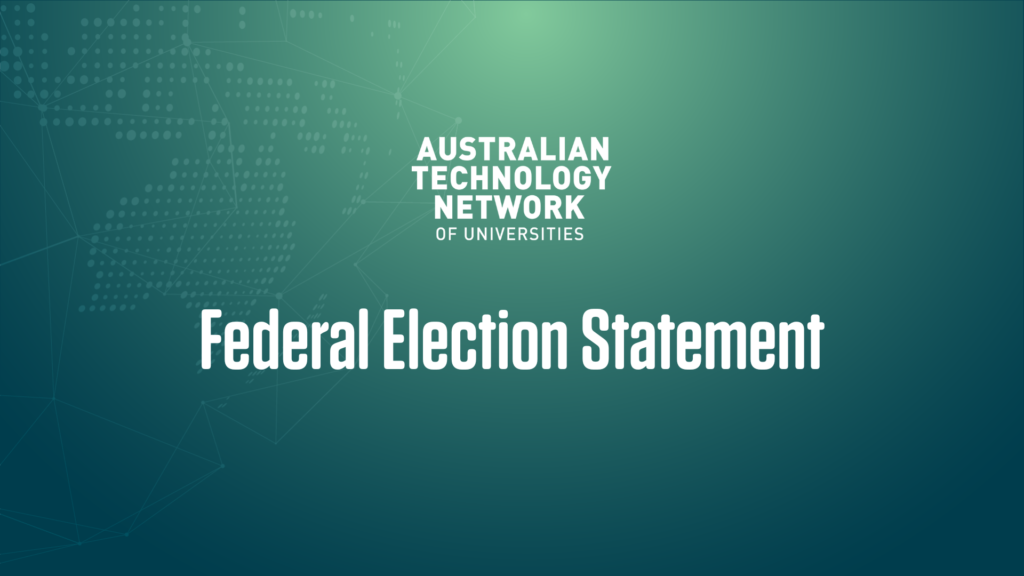Education Services for Overseas Students Amendment (Quality and Integrity) Bill 2024 – Submission
Key takeaways:
- Policy settings should ensure long-term stability, recognise market dynamics, and accelerate the ability of the higher education sector to fulfil the objectives of the Universities Accord.
- The policy objectives of the Bill should be considered holistically and sequenced with other reforms to the tertiary education and skills system.
- Amendments to the Bill, particularly in relation to powers to cap or cancel courses, would minimise regulatory overreach.
- The Framework should factor in a minimum transitional period of twelve months to enable workable timeframes and genuine co-design of key settings with the sector’s expertise and the ATEC.
The Australian Technology Network of Universities (ATN) appreciates the opportunity to provide a submission to the Senate Education and Employment Legislation Committee (the Committee) as it considers the Education Services for Overseas Students Amendment (Quality and Integrity) Bill 2024 (the Bill). ATN member universities are known for their success in producing competent, adaptable and curious graduates who are equipped to think critically and hit the ground running in current and emerging industries. Collectively, we teach about 20 per cent of Australia’s domestic students, at least 14 per cent of Australia’s onshore international cohort and a similar number of students overseas.1 Our universities are consistently highly ranked for quality of education and research.
Policy settings should ensure long-term stability, recognise market dynamics, and accelerate the ability of the higher education sector to fulfil the objectives of the Universities Accord
Examination of this Bill comes at a critical time, as public universities – inherently not-for-profit enterprises – try to innovate to remain sustainable amid multiple challenges. These include current visa settings under the Government’s migration policy, diminishing funding for research and development, and competition from traditional and emerging international education providers around the world. Public universities play an essential role in creating educated, skilled graduates and contributing ground-breaking research to our economies and our communities, in service of our national interests both here and overseas.
ATN is committed to a vibrant, sustainable tertiary education sector which provides a high-quality experience for domestic and international students, is diverse and inclusive, and produces the graduates and research Australia needs to be successful now and into the future. To realise this vision, we support settings that:
- ensure long-term policy stability for the benefit of both Australian universities and the students making significant career and life decisions by choosing to study at them,
- seek to achieve results which recognise the powerful market dynamics, and through proportionate regulation only where absolutely necessary, and
- accelerate the ability of the higher education sector to achieve all that is envisaged in the Universities Accord endorsed by the Government.
We note that regulatory options like those proposed in the Bill are unlikely to materially affect international student demand in ways which serve policymakers’ needs. International students will continue to choose to study the courses that they assess make sense for their own career ambitions at the locations in which they wish to live. If those options are not available to them in Australia, or prove too expensive or uncertain, they may look elsewhere. Low enrolment caps may create unintended consequences as institutions struggle to justify diversifying their international student cohorts when they could focus efforts on those students who pay the highest fees.
The policy objectives of the Bill should be considered holistically and sequenced with other reforms to the tertiary education and skills system
It is important to acknowledge the impacts of hard enrolment limits that would flow through to the rest of the university ecosystem. As not-for-profit entities, public universities re-invest any surplus received from international student tuition into high-quality educational experience for domestic students – particularly students whom, the University Accord notes, are more costly to teach, including those from underrepresented backgrounds – and covering the full costs of research. This revenue also allows universities the financial flexibility to invest in longer-term projects like world-class teaching and learning facilities, student accommodation and transnational education, and to remain globally competitive and outward-facing in an increasingly interconnected world.
As such, it is important that the reforms enacted through this Bill are sequenced with other reforms envisaged in the Universities Accord. Review and sunset clauses could require that the powers in the Bill transition to the Australian Tertiary Education Commission (ATEC) when it is established, ensuring that the ATEC is empowered to provide the oversight intended by its creation. Collectively, these reforms will position the tertiary education and training system to reach more Australians, deliver a pipeline of qualified graduates who are ready to join the workforce, and contribute world-class research to support Australian interests.
Should the Bill pass, changes to related policies that have also tried to address the objective of managing numbers of incoming students must be reversed so that education providers can make enrolment decisions with a reasonable degree of certainty. For example, recent data indicates that changed visa settings had resulted in successful visa applications between January and April 2024 dropping 29 per cent against the same period in 2023.22
Amendments to the Bill, particularly in relation to powers to cap or cancel courses, would minimise regulatory overreach
Should the Committee decide to recommend that the Bill proceed, we urge it to consider amendments which would ensure capping powers are as limited as possible while still achieving the Bill’s objectives. Although the Government has sought to characterise elements as ‘reserve powers’3 they would nonetheless be enshrined in legislation and difficult to walk back in the future. ATN Universities would support amendments which would require the Government to consult with the regulators of Australia’s tertiary education system, the Tertiary Education Quality and Standards Agency and the Australian Skills Quality Authority, before setting caps. As noted above, review and sunset clauses for such powers could also provide some reassurance, for example provisions which place the powers of this Bill in the remit of the proposed ATEC.
ATN Universities joins others in the tertiary sector in calling for the removal from the Bill of a power to cap or cancel individual courses. If implemented as proposed in the Bill, such powers would be broad and unchecked, impeding an institution’s ability to operate autonomously and risking further excessive intervention in future. This arrangement would result in the Government exercising an unprecedented level of control without having the information it needs to make good decisions which deliver intended policy outcomes. Further, it is unlikely to address the quality and integrity issues the Bill purports to address, as these exist primarily at provider level and not at course level.
We also see risks in provisions proposing to suspend providers automatically if they breach any enrolment limits that have been set. Numbers of enrolments typically fluctuate but ultimately smooth out over the course of an academic year. Given the severity of consequences, this power should only be enacted after consultation with relevant regulators.
The Framework should factor in a minimum transitional period of 12 months to enable workable timeframes and genuine co-design of key settings with the sector’s expertise and the ATEC
The timelines envisaged in the Bill are impractical. The recruitment and admission process begins 12-18 months in advance of enrolment and can often take longer if there are specific requirements such as government sponsorship or proving that students meet English language thresholds. Moving to implement the policy in full for 2025 will come at the expense of sustainable long-term settings. It is also essential to manage future student expectations and support agent networks appropriately.
ATN Universities strongly supports a transitional 12-month period, at a minimum, before implementation of the policy from 1 January 2026. For public universities, this timeline would allow for the ATEC to be established and negotiate individual compacts and would align more realistically with university and student timelines for decision-making. A transitional period would also allow the Government to make better use of the extensive expertise across the sector and engage in a genuine process of information-sharing and co-design to achieve desired policy objectives.
ATN Universities thanks the Committee for the opportunity to comment. We will continue to work closely with the Government and the rest of the tertiary sector towards cohesive and sustainable settings for a high-quality and sustainable higher education system.
Further enquiries should be addressed to: Dr Ant Bagshaw Executive Director Australian Technology Network of Universities info@atn.edu.au

